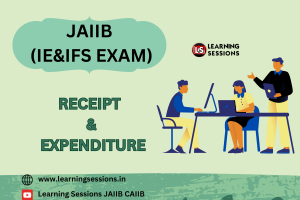The Indian economy operates under a complicated structure that involves balancing receipts and expenditures, both at the central and state levels. Learning Sessions presents this article on the case study that explores the primary features of receipts and expenditures in the Indian economy, with a particular focus on its relatedness to the JAIIB examination, specifically within the module on Indian Economy (IE) and Indian Financial System (IFS). It forms the foundation of public finance, fiscal policies, and overall economic management.

📚 JAIIB Study Resources 📚
👉 Check Here
👉 Check Here
👉 Check Here
👉 Get Tests Here
👉 Check Here
DOWNLOAD PDF RECEIPT AND EXPENDITURE-CASE STUDY
In the context of JAIIB Indian Economy and Financial System, understanding the interplay between receipts and expenditures is determining for grasping the fiscal policy framework. Fiscal policy involves the use of government receipts and expenditures to influence the overall economic activity. When government expenditures exceed receipts, it leads to a fiscal deficit, which must be financed through borrowing. Revenue Deficit occurs when the revenue receipts fall short of the revenue expenditure. A high revenue deficit often indicates inefficiencies in revenue generation and excess spending on non-productive activities. The Indian government has been focusing on reducing the fiscal deficit and revenue deficit through various reforms such as GST implementation, disinvestment strategies, and rationalization of subsidies. For the extensive preparation of candidates, get details through our YouTube videos for JAIIB IE & IFS Module wise Syllabus with explanations and tips to help candidates in their preparation journey.
You may also like these JAIIB Case Studies:
JAIIB | IE & IFS | MUTUAL FUND
JAIIB | IE & IFS | LAW OF SUPPLY
The receipts and expenditure patterns of the government have direct implications for the Indian financial system in the form of Public Debt Management, Inflation Control, Investment Climate and Banking Sector’s Role. Learning Sessions provides additional information about JAIIB IE & IFS FACTORING by giving examples of real life scenarios.
Receipts and expenditures form the backbone of India’s fiscal framework and directly influence the economy’s overall health. Learning Sessions brings this article for banking professionals preparing for the JAIIB (IE) and (IFS) module, mastering the concepts of revenue, capital receipts, and expenditures is key to understanding how public finance operates. A balanced and ethical approach to managing receipts and expenditures ensures that the Indian economy continues to grow, while maintaining fiscal discipline.
Learn more about this case study through our YouTube channel and PDF.
Get access to our Telegram Channel for free Pdfs of JAIIB.





